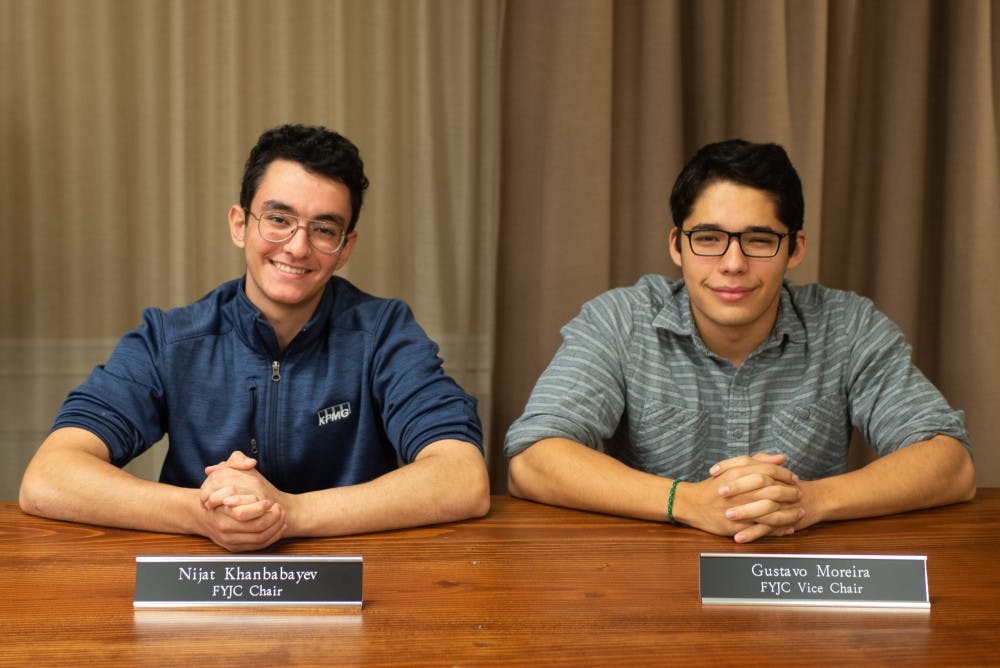The 2018-19 University Judiciary Committee appointed 12 new members to the First Year Judiciary Committee last month after reforming its application process to no longer require applicants to take a preliminary multiple choice and short answer exam to become a member.
First-year College student Nijat Khanbabayev and first-year Engineering student Gustavo Moreira were selected to serve as FYJC chair and vice chair under the revised essay-based application format and began their duties this past week during the first round of trials.
FYJC is composed of 12 first-year students who are responsible for investigating and trying potential violations committed by first-year students to the University’s Standards of Conduct, which address behavior such as the damage of or unlawful entry onto University property, disorderly conduct on University property or the violation of state or federal laws.
“We feel having first-years be the ones who get to hear cases by other first-years gives those students a more sympathetic ear that is perhaps more understanding and closer to the actual lived experiences of being a first-year,” said Sam Powers, a fourth-year College student and vice chair for first-years, who serves as an advisor to FYJC.
Representatives for UJC’s main body are required to have been at the University for at least three semesters, and oftentimes Law or graduate students will sit as judges on cases of alleged violations committed by undergraduate students. This trend prompted the creation of the FYJC in 1969 as a subsidiary of the First Year Council — a branch of Student Council at the time — to prevent first-years from being tried by much older students. The UJC and FYJC were officially incorporated as independent bodies separate of Student Council in 1980.
“It sort of brushes over the ideals of student self-governance that we shoot for and we strive for, and so we determined that having a FYJC would help to bridge that gap and really have it be a trial by your peers, judgement by your peers,” said Kevin Warshaw, a fourth-year Engineering student and UJC chair.
Although a subsidiary of the UJC, the FYJC is granted the same sanctioning authority as the UJC and operates under the same by-laws and trial procedures.
If guilt is established during a trial, the FYJC then holds a separate trial for sanction to determine a fair and reasonable punishment. Khanbabayev and Moreira agreed that attempts to correct student violations should be rehabilitative and educational in nature.
“The point of it — I feel for both of us — is not to punish people for doing wrong, but to maintain a positive community,” Moreira said.
Khanbabayev added that the FYJC will rarely expel or suspend a first-year student for violating the Standards of Conduct — barring extreme circumstances. Rather, the committee is more interested in assigning reflective essays and community service. Community service sanctions are typically assigned to Facilities Management, Gordie Center, Parking and Transportation or Recycling.
“I want to try to help represent the student body and be transparent, where I want to make sure that [the] sanctions that I give are going to be educative,” Khanbabayev said. “It’s not just to punish people, but to help make sure that they’re being safe and they’re helping preserve this community and they’re being respectful.”
During the 2017-18 term, FYJC gave out 11 admonitions, with sanctions including 10 essays totalling 6,050 words and 30 hours of community service, according to Chirag Kulkarni, a second-year College student and UJC senior data manager. As a whole, UJC gave out 88 admonitions, including assigning three meetings with a dean, 11 educational classes, 51 essays, 1,185 hours of community service, two suspensions and one expulsion. 110 hours of community service, 10 suspensions and two expulsions were held in abeyance — meaning they will be put into action if the student comes back after violating a certain condition.
The most violated standards were Standard 6 and 10, which is mostly comprised of cases of underrage drinking and obtaining fake IDs. Between April 1, 2017 and April 1, 2018, there were 63 students accused of violating Standard 6 — 42 of whom were found and plead guilty — and 45 students were accused of violating Standard Ten — 30 of whom were found guilty, while 28 plead guilty.
“Whenever I carry a trial, I hope to be fair and impartial to the student body,” Moreira said. “I feel like it’s a lot of responsibility that’s put on our shoulders, so I think that in the long-run I want to continue the legacy of UJC being fair to its students but especially [first-years] in emphasizing that everyone who is a first-year is prone to making more mistakes because of it.”
UJC received a total of 83 applicants for FYJC, and the current body will continue to hear cases until all of the first-year trials have concluded.







